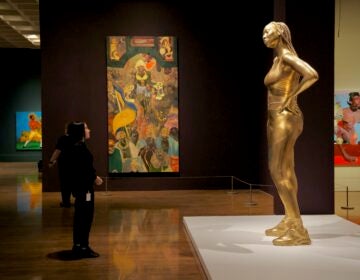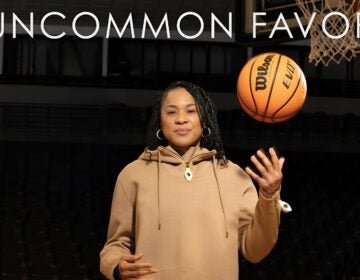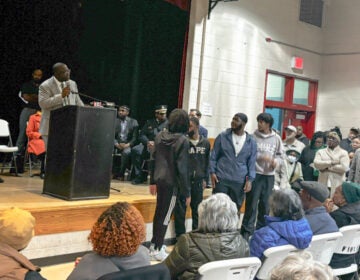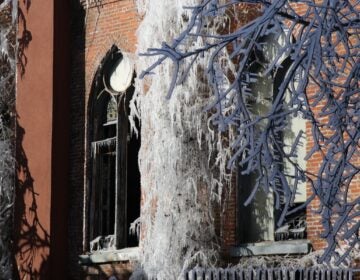Back on its feet: North Philly’s Rush Arts gallery rebuilds after hurricane damages
“The water damage destroys everything it touches. The next thing is putting it back,” said the contractor repairing the building.
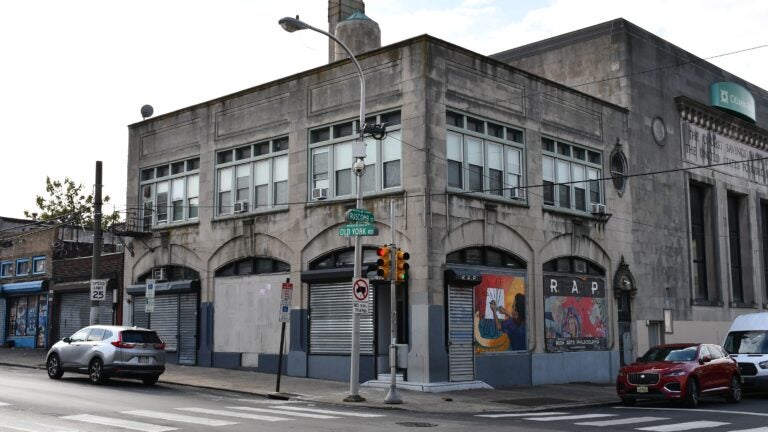
The Rush Arts Philadelphia gallery, located at the corner of West Ruscomb Street and Old York Road in North Philly.
From Philly and the Pa. suburbs to South Jersey and Delaware, what would you like WHYY News to cover? Let us know!
As Hurricane Debby made its way across the eastern United States in August, it brought flooding and destruction to one of North Philly’s philanthropic art galleries, Rush Arts Philadelphia. Four months later, after many obstacles, the gallery is finally getting back on its feet.
Rush Arts was founded by Danny Simmons in 2016 and is part of the Rush Philanthropic Art Foundation founded in 1996, also co-founded by Simmons, his brother Russell and Joseph “Rev. Run” Simmons of the hip-hop group Run-DMC. According to its website, the organization aims “to fill the gap that the disenfranchised and people of color face in both accessing the arts and exhibition opportunities.”
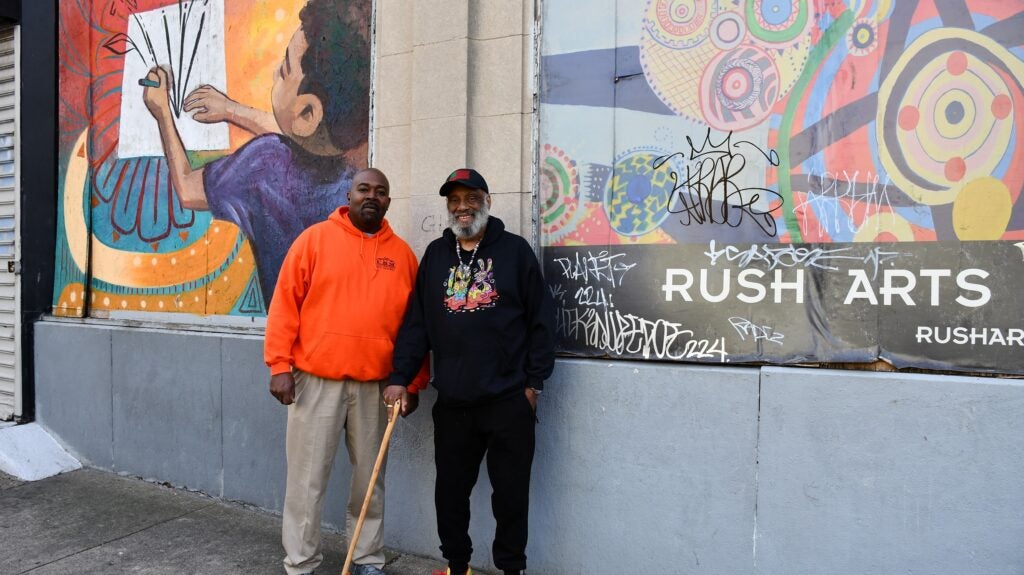
“We have children’s programs that teach art to kids and sometimes seniors,” Simmons said. The gallery also hosts exhibitions for emerging artists, up to six a year, with the goal of bringing art to the community.
“Put paint where it ain’t,” explained Noah Smalls, gallery director, when describing the decision he and Simmons made to establish the gallery in North Philly.
Rush’s operations came to an abrupt halt in August as Hurricane Debby made landfall in Florida and tracked up the Eastern Seaboard, dumping large amounts of rain and flooding and causing alarm to tenants living above the gallery.
“When Debby first hit, the tenants immediately called when water started coming into the upstairs hallway,” said Smalls, who contacted insurance.
“As the insurance company was inundated with calls about Debby, it took them several days to send someone out to assess the damage, but it kept raining all that week,” said Smalls.
“Floor joints had started coming up, the walls were ruined, everything was ruined,” Simmons said.
After several days of delays, a third-party contractor gained access to the roof of the building and found a bottle had clogged a drain. Shortly after, an insurance adjuster then emailed Rush, asserting the bottle was intentionally placed there and, as a result, the damages would not be covered.
However, the insurance adjuster inadvertently included more information in the email, exposing other intentions.
“In that email [sent to Rush] it had a chain of messages attached that had gone back and forth when he [the adjuster] engaged the third-party contractor to go out to our site. And in that messaging he clearly stated: If you investigate this and determine that this was not caused by the storm, we will not have to pay and investigate any further,” Smalls said.
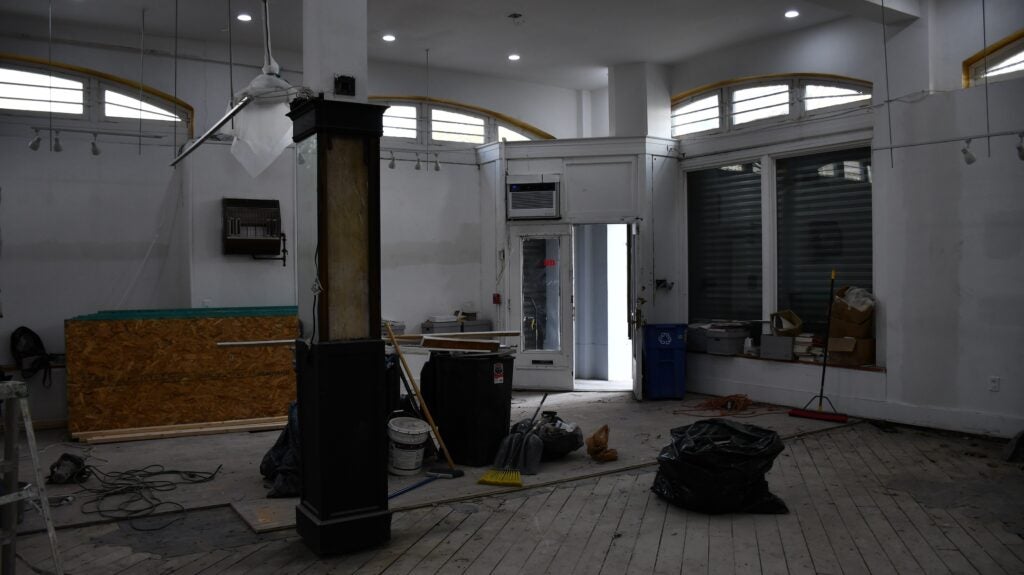
Simmons and Smalls sought a second opinion, doubting the drain was intentionally clogged, and contacted their roofer. “We had records to show that we had been maintaining the roof every six months,” Simmons said.
Over the following months, Rush leadership reached out to a board member who offered legal support. “He looked over the scenario and suggested that it didn’t seem like a matter handled in good faith,” Smalls said.
Smalls contacted the insurance company again, attaching the email chain and the opinion from the lawyer, asking for a supplemental investigation.
“Very subtly and quietly they re-opened the claim,” Smalls said. Another adjuster came to inspect the building and determined that the extent of the damage could only have been caused by hurricane-force winds. The insurance claim was finally approved. The whole process took until early November for Rush to settle with the insurance company.
During this time, Marc McKee, a friend of Simmons and the CEO of his own contracting company, stepped in to provide a cost estimate and handle repairs to the gallery.
“The water damage destroys everything it touches, I’m having to redo a lot of stuff,” McKee said. But he is determined to finish the job. “The next thing is putting it back,” he said.
For McKee, helping Simmons is also part of his larger aspirations to start a nonprofit to help formerly incarcerated individuals learn construction skills. The nonprofit will be called the Restoring Lives program.
“I was in the system, I had a good support group when I came home, I had people like Danny, now it’s my turn to give back and make sure I’m doing what I’m supposed to do to help people, ” said McKee.
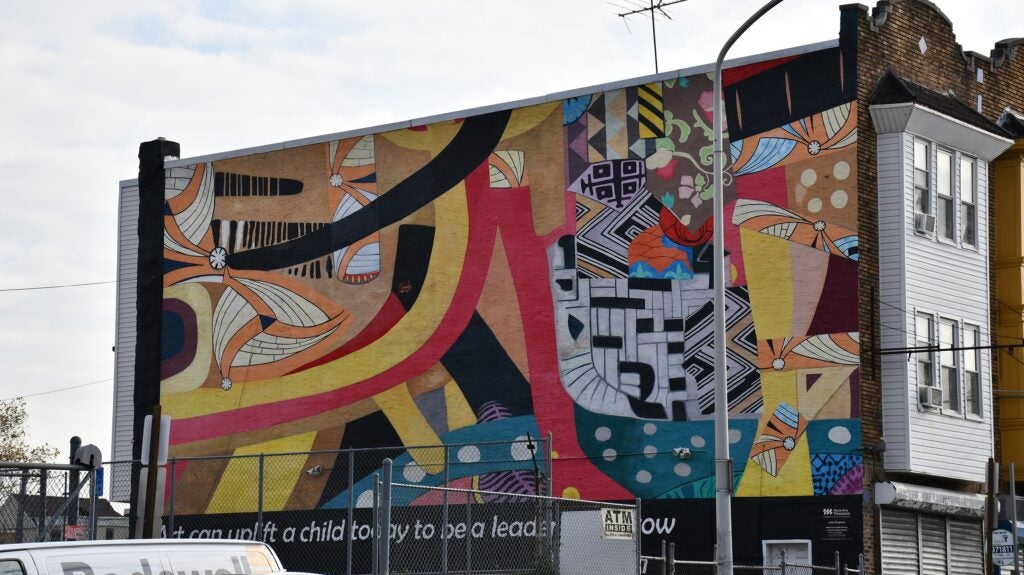
“We’re gonna revamp the smaller side of the gallery into an office where he’s setting up different areas, such as kitchens and bathrooms, where people can learn construction skills,” Simmons said.
Simmons aims to fully reopen Rush by January next year. The relaunch will feature year-round programming celebrating the Rush foundation’s 30th anniversary and introduce the Restoring Lives program.
“We’re gonna partner and have two nonprofits here, restoring the community,” Simmons said.
WHYY is your source for fact-based, in-depth journalism and information. As a nonprofit organization, we rely on financial support from readers like you. Please give today.


